- Home
- STEVE MARTIN
The Pleasure of My Company Page 8
The Pleasure of My Company Read online
Page 8
I had actual purchases to make at the pharmacy and it was just luck that I fell into the correct rotation that allowed Zandy to wait on me. I was buying sixteen Chap Sticks. This was not a compulsion; this was practical. Ten go in a drawer, and I place the other six around the apartment for handy access. I handed her the cash and she might as well have called me by name, as she referenced every prescription drug I ever took.
“Still taking the Inderal?” she asked.
I had tried Inderal for a while to keep my heart from racing; I was off it now. “Not much,” I said.
“How’d you like Valium?”
“Left me kind of groggy.
“You stopped your Prozac.”
“Don’t need it anymore.”
“Got a thing for Chap Stick, huh?”
She could have been on a data-gathering mission, or she could have been flirting with me. I couldn’t tell which. But it was profoundly intimate for her to know what drugs were flowing through my own personal veins. If a waitress were asking me these questions I would definitely consider it a come-on.
Up close Zandy failed in the perfection department, which made me like her more. The button of her nose was askew, as though someone had dialled it to three. Her skin, though, was so dewy and fresh I couldn’t quite turn to go. I picked up my sack of Chap Sticks, and she said, “Don’t forget your change,” and then she added a wonderful thing: She said, “See ya.” I had to stay there a second and take her in before I was able to unstick my gummy feet from the floor.
It was nearing two and I wondered if Clarissa was going to show up this time. There was no reason to think that she wouldn’t, as she had slipped a handwritten note under the door earlier in the week with a sincere but formal apology, promising we would resume the following week at our usual time. I assumed that this was the standard apology that one learns in chapter 15 of the therapist’s handbook: Don’t give out too much personal information. But the idea of the dispassionate shrink slinking up the patient’s stairs and secreting a note under the doorjamb probably wouldn’t go down well with whatever board would review such things. Still, Clarissa was only a student and allowed to act like one.
Friday at two o’clock—precisely when the second hand fell on neither side of twelve—Clarissa knocked, pushing open the door that I had purposely left ajar. She said, “I’m so sorry.” Clarissa was an apology champion. “Are you all right?” I asked, probing for information I already knew but wanted her to tell me. “Oh yes,” she said, “I couldn’t get a…” She was about to say “babysitter” and then realized it would reveal too much and she changed mid-sentence to “I got tied up and there was no way to reach you.”
“Would you like something to drink?” I offered.
“Do you have a Red Bull?”
Red Bull is a potent caffeine-infused soft drink that turns grown men into resonating vibraphones. Drinking a Red Bull is more impressive to me than drinking a bottle of Scotch. Several years ago after my first Red Bull—which was also my last—I got in marksman position on the living room floor, opened a pack of playing cards, and repeatedly dealt myself poker hands. I computed that good hands came in bunches; that one full house in a shuffle implies a possibility of more full houses. And lousy hands in a shuffle only create the possibility of more lousy hands. So Red Bull was not allowed in my house, only because this little episode lasted nine hours. Clarissa’s request for the caffeine recharge indicated to me that she was going to have to be bucked up if she was going to make it through my session.
“I don’t have any Red Bull but I know who might,” I said.
I excused myself to go to Brian and Philipa’s amid protestations of “you don’t have to” from Clarissa. I peered into her apartment and saw Brian flaked out on the sofa, his jaw hanging open like a drawbridge. I didn’t have the heart to wake him. I came back to see that Clarissa had settled into the easy chair and was staring at the floor. She was wearing a prim pink blouse that made her look so wholesome it was as if Norman Rockwell had painted a pinup. She had a bloom on her cheeks that lied about her real age. Her face had gentle angles, one rosy thing sloping into the next, and it suggested none of the hardness she must have experienced. It seemed as though she were determined to stay innocent, to hang back even though life was dragging her painfully forward. And all my conjecture bore out because she looked up at me and tried to say, “And how are you?” She choked it out but couldn’t continue. She looked down again and I was stymied. I sat. Oh, this was enough to make me love her, because I was right with her, understanding every second and longing to step in. I didn’t even need to know the specific that was troubling her, because to me her halting voice easily stood for the general woe that hangs in the air, even on life’s happiest days.
Clarissa didn’t apologize for her broken voice, which meant that she was, in these few moments, being personal with me. Her apologies were a way of maintaining distance and formality. She turned toward the window and braced herself up a few inches to see the sidewalk. I knew that soon I would manoeuvre myself into position to see what she was looking at. Everything seemed to be okay and she turned back to me with an empty sigh. “Sometimes,” she said, “I feel like I’ve been to heaven and been brought back to earth. I’ve seen how things should be and now I’m here seeing how things really are.” Her head glanced around again.
I got up, folded my hands across my chest, and leaned against the wall. I could see the raven-haired woman on the street, hand in hand with the boy—the same boy I had seen her with at the mall—and I wondered why Clarissa, if she had someone to watch her child, would have them tag along on her work rounds. As I listened to Clarissa and watched the plotless drama on the street, I noted a black Mercedes turn the corner and cruise by. I noted it because it was the second time I had seen it in less than a minute and it was significantly under speed. This second time it passed, the raven-haired woman saw it and took a few steps back. The car slowed to a stop, then reversed itself. Clarissa saw me looking out the window and she rose and turned to me, scared. The car was now stopped in the street, carelessly angled. The driver got out of the car and left the door open, approaching the woman and child. He was groomed like a freshly cut lawn. A trim beard framed his face; close-cut grey sideburns fringed his bald head. His suit was well cut and dark and set off by a stark white shirt. I could hear him yelling and cursing. He was wound tight and unwinding rapidly in front of us.
A horrible chain reaction occurred. The man, who looked like an Armani-clad Mussolini, increased his screaming and made his hand into a beak and began poking at the woman like an angry swan. She was knocked unsteady with each jab but defended herself with angry, equal shouts. But the man lost control and pushed her too hard. She lurched back, tripping. But she was holding the hand of the boy and as she fell, he fell with her. With this blow the chain reaction became uncontained, entering my apartment. I felt the shove that drove the boy to the ground and experienced his terror at the noise and violence. I was down the steps running toward the scene, hearing Clarissa screaming and running behind me, hearing Tiger barking from Philipa’s window. I took the steps in threes as the legendary slow-motion of panic set in and turned seconds into minutes. I wondered, in these moments while time stretched itself, why I could not step off a curb but stairs did not present a problem. Why could I not rename the curb to stair step and be on my way? Why do I see the light from a lamp as a quantity and not as a degree? Because it was written on the bulb, that’s why. I suddenly knew what my enabler was: language. It was my enemy. Language allowed me to package similar entities in different boxes, separate them out, and assign my taboos. I was at the bottom of the stairs when time caught up to itself. A child’s scream broke my thoughts; chaotic and angry voices jarred me. I heard my breath gasp and heave as I turned and headed toward the lawn.
The attacker pushed his voice to a rasp and I heard him yelling cunt, cunt, you cunt. I was barrelling across the grass when he turned and grabbed the child’s arm, trying to pull
him up, but I threw myself between them and covered the boy like a tarpaulin. The man tried to pull me off, but I had clenched my fist around a countersunk lawn sprinkler and I was impossible to move. He began to kick my ribs. Fuck you fuck he said.
He tore at my shirt trying to lift me off the boy, whose shrieks had intensified, had penetrated Philipa’s apartment, and had roused an angry superman. For the next thing I knew, the bearded man had been lifted off me and thrown against his car. And I saw Brian holding him there, standing between me and him, while Tiger gnarled a few feet away. The man was foaming and spitting and he swore at Clarissa and jerked himself away from Brian, who was twice his size and a hundred times more a man, and who continued to menace him, forcing him back to his car. Before he peeled away, Brian took his foot and kicked the Mercedes door, which I realized later had probably created a three-thousand-dollar dent.
Clarissa swept up her boy, who was wailing like a siren. She held the back of his head against her and he slowly calmed. The scene quieted, and we stood there in silent tableau, but anyone coming upon us would have known that something awful had just happened. Clarissa approached where I lay in a clump on the ground and asked was I all right. I said yes. She pointed to the raven-haired woman and said this is my sister Lorraine, and I said that’s Brian. And Brian stood there like Rodin’s Balzac. He looked around, “Everybody okay?” Yeah, we all said. Then Clarissa urged the child forward and said, “This is Teddy.” Teddy held up his arm, spreading his fingers and showing me a grass-stained hand. My shirt was torn open and Clarissa touched my exposed ribs. “Ouch,” I said. And I was pleased that I had chosen the perfect word for the occasion.
After making sure that Mussolini was gone and couldn’t see our destination, we five soldiers marched up to my apartment. Brian took charge and I asked if he had a Red Bull and yes, he did. Then I wondered if I had made a mistake; I worried that it might be dangerous for Clarissa to have a Red Bull now, when she was most inclined to load a gun and mow down her child’s attacker. I decided to put her on crime watch. If ever there was a moment for my Quaalude-laced wheatgrass drink, it was now, but I had long since decided that spiking punch was a bad idea, bordering on the immoral. Anyway, I was nervous about the chemical collision of an upper and a downer, and wondered if the combination could create a small explosion right in the can.
Teddy scrambled around my apartment on hands and knees, occasionally rising on two feet and moving hand over hand along the windowsill. Brian stood like a sentry and was asking questions like “Who was that guy?” that never quite got answered. But I did know what he was: an angry, unmanageable tyrant, haunted by imagined slights, determiner of everything, father of Teddy, ex-husband of Clarissa. This marriage couldn’t have lasted long, as she’s young, the boy’s an infant, and the husband’s too violent to have been with her a long time. I assumed that Clarissa would have left when his monstrous streak first appeared and that he had no reason to hide it once he was in possession of her.
Clarissa’s sister, who evidently had flown in from somewhere to stand sentry over Teddy until the crisis passed, was the most upset at Mussolini and also was the most lucid, rattling off all his worst qualities to Clarissa and listing all the legal and practical ways to intimidate him. “Clarissa, I know you can’t hate him because he’s the father of your child, so I’ll hate him for you,” she said.
Clarissa quaked imperceptibly, and I watched her contain herself. She pulled herself inward, doing what she had to do as a mother: think how she could protect Teddy. She looked around the room as she thought, holding each position for an instant before shifting her head or body. As ideas occurred through her, she would respond to them physically. She shook her head; she would express dismay; her lips would tighten. Finally she whispered, “I can’t go home. Where can I go?”
Lorraine said, “You can stay with me.”
“No, no,” said Clarissa. “He knows where your hotel is.”
I said, “You could stay here for the night. All of you.” They all looked at one another and knew it was a good idea.
A few hours passed. Brian had secreted Clarissa’s car behind the building and parked it in Philipa’s space; if Mussolini drove by later and saw her car in the street he would bang down every door in the neighbourhood trying to find her. Lorraine and Clarissa were going to sleep in my bed with Teddy between them. I would sleep on the sofa. Philipa brought in a sack of fried chicken, a donation. Tiger smelled it and gave me an imbecilic grin of anticipation. I offered him a leg and tried to switch it at the last second with a palmed dog biscuit, but he wasn’t fooled, even after I had smeared it with chicken grease. I made the sofa into a bed with a blanket I borrowed from Tiger, which was covered with a wide swath of dog hair.
As night began to fall I started to worry. When Clarissa went to sleep, she would naturally turn out the lights in my bedroom, which would prevent me from turning out the lights in the living room, which meant I would be sleeping under 1125 watts of power. Later in the evening, I noticed she had left a night-light on, which meant I could kick off the fifteen-watt range light. But that was it. I was attempting sleep in the land of the midnight sun. I turned facedown and buried my head in the cushions. After a restless twenty minutes of pretending, I heard a door creak and then footsteps headed my way. Clarissa’s hand touched my shoulder and I turned.
“I just wanted to say thank you.”
“Oh,” I said. “I didn’t do anything.”
“Daniel, I was lying in bed thinking about all this and I realized I won’t be able to treat you anymore. It’s not proper for you to know all this about me. I’ll have to ask them to refer you to someone else.”
“Do the same rules apply even if you’re only an intern?” I asked hopefully.
“Even more so. I have to show respect for how things are done,” she said. “It would be serious for me not to report this.”
Clarissa was Mother Teresa to my leprosy. She leaned in toward me. I watched her lips part and close; I heard her breath between the words. In close, her voice changed. Lower, more resonant, like wind across a bottle top. In close, her beauty trebled. Her hair fell forward and scattered the hard light on her face into softer shadows. Her hand rested languidly on the sofa, palm up, almost like it wasn’t part of her, and the pale side of her wrist was lost and wan, longing for sun.
“Thank you for letting us stay here. We’ll look for somewhere else tomorrow.”
“You can stay here as long as you need to,” I said.
“We might need to stay here tomorrow. I called his sister. She told me he’s got to be back in Boston on Saturday. If he goes, we’ll be all right.”
Clarissa squeezed my elbow and then stood up. “Do you want me to turn out the lights?” she asked.
“No,” I said, “I want to read.” There wasn’t a book nearby and I had never told her of my wattage requirements, so she looked around, momentarily puzzled. But this was such a tiny bewilderment at the end of doomsday it hardly mattered. She retreated into the bedroom, leaving the door cracked open.
As midnight closed in on us, the extraneous sounds of televisions and cars, footsteps and distant voices unwove themselves from the night. I closed my eyes. The light no longer bothered me. I thought of the two women in my bed and the protective sandwich they made that held Teddy in place. My body curled and tightened as if being pulled by a drawstring. I gasped for breath. I pictured myself spread over Teddy like a blanket, but I was watching from above, just as Clarissa watched herself from heaven. The kicks intended for Teddy were taken and absorbed by my body. There was something about having intervened at the exact moment of heartbreak that evoked a deepening melancholy, and I hiccupped a few sobs. I then saw myself as the boy, hearing and sensing the blows from overhead, and why did I, rolled up on the sofa clutching a pillow, say out loud, “I’m sorry, I’m sorry”?
I heard a few small wahs during the night, a few footsteps pattering around, and I think we all had a fitful sleep. By 5 A.M., however, nothi
ng stirred except my eyeballs, which delighted in having a fresh ceiling to dissect. Silence had finally struck Santa Monica, which put my mind in the opposite of a Zen state. Rather
than my head being empty of thought, every crevice was bursting with facts, numbers, revelations, connections, and products. After I had deduced, or more properly, induced how Aquafresh striped toothpaste is coaxed into the tube back at the factory, I created a new magic square:
I was lost in the vision of the square, this graphic of my current life, when one of its components, Teddy, creaked open my bedroom door and crawled a few feet into the living room, pausing on all fours. The component looked over at me and grinned. He then made a surprising feint right but went left, then pulled himself up and leaned against the wall, moving his eyes off me only for necessary seconds. He turned and pressed his palms against the wall and then circumnavigated the room until he had gotten to the sofa where I was trying so hard to sleep. He plopped back on his rear end and extended his arms toward me, which I supposed to be some sort of cue for me to pick him up, and I did. I placed him on my chest, where he sat contentedly for about a minute, and I said something that had an intentional abundance of the letter b in it, as I thought the letter b might be amusing to a one-year-old. I started with actual words—baby, booby, bimbo—then degenerated into nonsense sounds: bobo, boobah, beebow. His expressions ranged from concentration, to displeasure, to happiness, to confusion, to distress, though as far as I could tell, there was absolutely nothing to feel displeasure, happiness, confusion, or distress about. Except for the letter b.

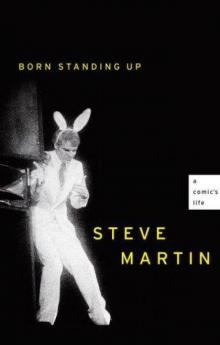 Born Standing Up: A Comic's Life
Born Standing Up: A Comic's Life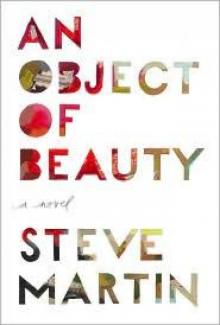 An Object of Beauty
An Object of Beauty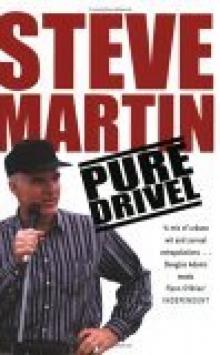 Pure Drivel
Pure Drivel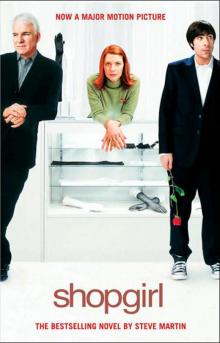 Shopgirl
Shopgirl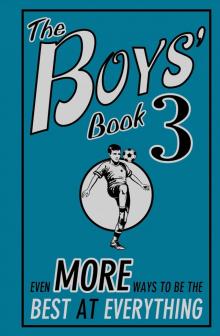 The Boys' Book 3
The Boys' Book 3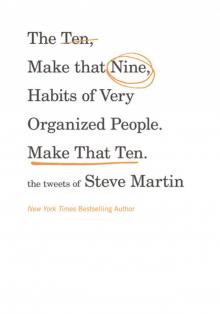 The Ten, Make That Nine, Habits of Very Organized People. Make That Ten.: The Tweets of Steve Martin
The Ten, Make That Nine, Habits of Very Organized People. Make That Ten.: The Tweets of Steve Martin An Object of Beauty: A Novel
An Object of Beauty: A Novel